Campuses of Georgetown University
The Campuses of Georgetown University, the Law School Campus, the Main Campus, and the Medical Campus, are located within Washington, D.C. Georgetown's Main and Medical Campuses are located in Georgetown, Washington, D.C. between Canal Road, Prospect Street, and Reservoir Road. The Law Campus is located in downtown DC on New Jersey Avenue, near Union Station. Other parts of Georgetown are located in the D.C. Area, including the Center for Continuing and Professional Education at Clarendon in Arlington, Virginia. Georgetown also has an overseas campus in Education City, Qatar, and villas in Alanya, Turkey and Fiesole, Italy.
 |
|
| Map and aerial view of Georgetown University campus in 2011 | |
History
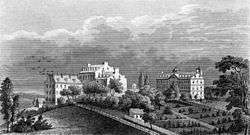
Prior to European colonization, the land that Georgetown University sits on was inhabited by the Piscataway people, an Algonquian nation that spoke a dialect of Nanticoke. The Piscataway lived in what is now Washington, D.C. and Southern Maryland for 13,000 years prior to the arrival of European settlers.[1] Georgetown University is built in its present location for a number of historic reasons. First is the location in the Jesuit colonized state of Maryland, within proximity to the port of Georgetown, and the access and opportunities that provided. In his Proposals for Establishing an Academy, John Carroll described the "salubrity of air" and "cheapness of living" as further reasons for the school's location.[2] Carroll did not know the nations capitol would be founded as such to include the campus, as DC was planned out in 1790 shortly after Georgetown's founding.[3] In 1792, Holy Trinity Church of Georgetown was completed. The proximity of the school to a Catholic church had been important in choosing a location for the Jesuit institution.
John Carroll obtained the legal rights to 60 acres (240,000 m2) of land from John Threlkeld in "Georgetown Heights" on January 23, 1789, though its first building, Old South, had already begun construction on this land in 1788.[3] In 1818, farmer turned Jesuit Joseph West donated funds to purchase a sizable expansion of the campus, in which he himself oversaw the construction of numerous "walks." Buildings such as the Reiss Science Building and the Leavey Student Center, as well as hospital buildings now occupy this space. Although this and other gifts gave Georgetown rights to over 200 acres (0.81 km2) of land in the area, much of this was sold off to meet the school's various debts over the years. This included the land north of modern Reservoir Road, which is now the neighborhood of Burleith.
Libraries
Georgetown libraries hold 2,435,298 items in eight buildings.[4][5] The Main Campus's largest library is Lauinger Library, named after an alumnus killed during service in the Vietnam War.[6] Lauinger Library includes the Woodstock Theological Center Library. Riggs Library dates from the nineteenth century, and was once the institution's primary library, but is now devoted primarily to archival historical materials and as a setting for formal university functions. Dahlgren Medical Library serves the Medical School, and like Lauinger Library, is built in the brutalist style popular in the 1970s.[7] The Edward Bennett Williams Law Library and John Wolff International and Comparative Law Library comprise Georgetown's Law Library, which is the fifth largest in United States.[8] Further, as a member of the Consortium of Universities of the Washington Metropolitan Area, students have full access to the Washington Research Library Consortium.[9]
Quadrangles
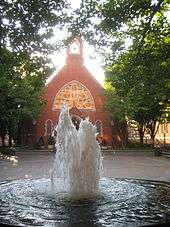
The main campus has traditionally centered on Dahlgren Quadrangle, though Red Square has replaced it as the focus of student life.[10] Old South was the first building to be built on the quad, though it was demolished in 1904 and replaced by Ryan Hall, Gervase Hall, and Maguire Hall. Old North, begun in 1794, remains in use for classes and offices.[11] In August 1797, George Washington visited the campus and addressed students from the porch of the Old North building; since then it has become a traditional spot for presidents to speak when they visit campus.[11] Dahlgren Quad is completed by the famous and historic Healy Hall, which is built in Flemish Romanesque style and is the undisputed gem of Georgetown's campus, and Dahlgren Chapel of the Sacred Heart.[12] In late 2003, the Southwest Quadrangle Project was completed. This project brought a new 907-bed student dorm, an expansive dining hall, an underground parking facility, and new Jesuit Residence to the campus.[13]
Housing
Housing on Georgetown's main campus is divided between "halls," usually more traditional dormitories, and "villages," usually less traditional apartment complexes. In addition, Georgetown operates many townhouses in the Georgetown neighborhood, usually for second, third, and fourth-year students.
Buildings
The McDonough School of Business is currently in the midst of constructing a new home for all of its business programs. The $82.5 million privately funded 179,000-square-foot (16,600 m2) building is scheduled to open in the spring of 2009. The new building will include increased seminar, lecture, conference room, office, and common area spaces, expanded career management and student services facilities, and a state-of-the-art 400 seat auditorium, among other features.
Overseas
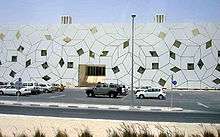
In December 1979, the Marquesa Margaret Rockefeller de Larrain, granddaughter of John D. Rockefeller, gave the Villa Le Balze to Georgetown University.[14] The Villa is in Fiesole, Italy, on a hill above the city of Florence. The Villa is used year-round for study abroad programs focused on specialized interdisciplinary study of Italian culture and civilization.[15] The main facility for the McGhee Center for Eastern Mediterranean Studies was donated to Georgetown in 1989 by alumnus and former United States Ambassador to Turkey George C. McGhee.[16] The school is in the town of Alanya, Turkey within the Seljuq-era Alanya Castle, on the Mediterranean Sea. The Center operates study abroad programs one semester each year, concentrating on Turkish language, architectural history, and Islamic studies.[17]
In 2002, the Qatar Foundation for Education, Science and Community Development presented the School of Foreign Service with the resources and space to open a facility in the new Education City in Doha, Qatar.[18] Georgetown University's campus in Qatar opened in 2005 as a liberal arts and international affairs undergraduate school for regional students.[19] In December 2007, Georgetown opened a liaison office in Shanghai, China to coordinate with Fudan University and others.[20] In 2008, the Georgetown University Law Center in conjunction with an international consortium of law schools established the Center for Transnational Legal Studies in London, England.[21]
References
- "Native Students And The Piscataway Fight For Greater Recognition". The Georgetown Voice. Retrieved 2020-02-22.
- O'Neill, Paul R.; Paul K. Williams (2003). Georgetown University. Arcadia. p. 2. ISBN 0-7385-1509-4.
- Curran, Robert Emmett (July 7, 2007). "Georgetown: A Brief History". Undergraduate Bulletin. Georgetown University. Archived from the original on May 24, 2007. Retrieved 2008-08-27.
- "Characteristics". National Center for Education Statistics. 2004. Retrieved 2007-07-11.
- "Georgetown Libraries". Library Homepage. 2007. Archived from the original on 2007-06-30. Retrieved 2007-07-11.
- Cho, Ah-Hyun (2005-11-08). "Buildings Pay Homage to GU's Most Famous Founders, Donors". The Hoya. Archived from the original on 2007-09-29. Retrieved 2007-07-03.
- Bademli, Irmak (2003-01-28). "Lovely or Lackluster?: the History Behind Lauinger Library's Architectural Design". The Hoya. Archived from the original on 2007-09-26. Retrieved 2007-07-03.
- "Library Resident Program". Georgetown Law Library. 2007. Retrieved 2007-07-09.
- "Washington Research Library Consortium". Consortium of Universities of the Washington Metropolitan Area. Retrieved 2007-07-11.
- Simpao, Bernadette. "Red Square". The Hoya. Archived from the original on 2007-09-29. Retrieved 2007-07-24.
- Botta, Jessica (2005-10-30). "A History of Old North". MSB Fact Sheets. Archived from the original on 2007-07-10. Retrieved 2007-07-08.
- "Healy Hall, Georgetown University Notecards & Prints". Wolf Run Studio. 2006-03-06. Retrieved 2007-07-08.
- Timiraos, Nick (2003-08-22). "From Hole to Home, Southwest Quad Completed". The Hoya. Archived from the original on 2007-09-26. Retrieved 2007-05-07.
- "Welcome to the Villa". Villa le Balze. Georgetown University. April 23, 2008. Archived from the original on December 7, 2008. Retrieved July 26, 2007.
- "Study Abroad in Italy". Villa le Balze. Georgetown University. April 23, 2008. Archived from the original on December 7, 2008. Retrieved August 12, 2008.
- "About". McGhee Center for Eastern Mediterranean Studies. Georgetown University. December 18, 2007. Archived from the original on December 7, 2008. Retrieved April 26, 2008.
- "Fall 2008: Semester Abroad". McGhee Center for Eastern Mediterranean Studies. Georgetown University. February 22, 2008. Archived from the original on December 7, 2008. Retrieved April 26, 2008.
- Heberle, Robert (May 20, 2005). "SFS to Establish Qatar Campus". The Hoya. Retrieved May 1, 2011.
- "Studying International Affairs". Georgetown University School of Foreign Service in Qatar. Archived from the original on July 10, 2007. Retrieved July 26, 2007.
- "乔治敦大学联络办公室 Georgetown University Liaison Office". Georgetown University Office of the Provost. 2009. Archived from the original on July 5, 2008. Retrieved February 4, 2009.
- Parks, Ann W. (November 3, 2008). "The Center for Transnational Legal Studies Kicks off in London". Georgetown University Law Center. Archived from the original on 2009-03-16. Retrieved July 12, 2009.
Gallery
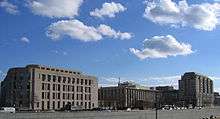 Law Center Campus
Law Center Campus The campus over the Potomac River
The campus over the Potomac River- Healy Hall
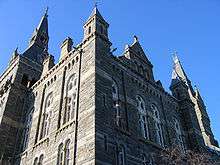 North tower of Healy Hall
North tower of Healy Hall- White-Gravenor Building
 Student studying on Copley Lawn
Student studying on Copley Lawn Observatory
Observatory
External links
| Wikimedia Commons has media related to Georgetown University campus. |
